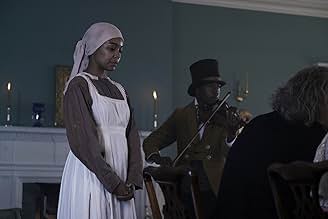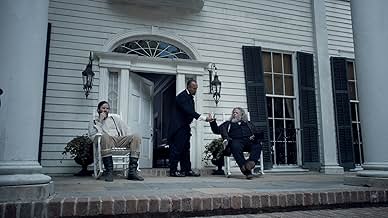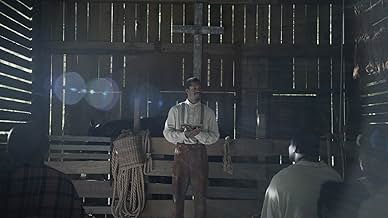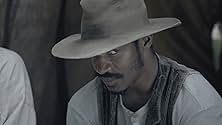Nat Turner, a literate slave and preacher in the antebellum South, orchestrates an uprising.Nat Turner, a literate slave and preacher in the antebellum South, orchestrates an uprising.Nat Turner, a literate slave and preacher in the antebellum South, orchestrates an uprising.
- Director
- Writers
- Stars
- Awards
- 5 wins & 32 nominations total
- Reverend Walthall
- (as Mark Boone Jr.)
- Nancy
- (as Aunjanue Ellis)
- Director
- Writers
- All cast & crew
- Production, box office & more at IMDbPro
Featured reviews
A film that wallows in the shadow of it's story and never really escapes it.
An enthralling directorial debut
Also, I don't know what this other critic user is talking about in regards to calling this movie, "racist crap" and giving it a 1 out of 10. The movie tells the story of a rebellious slave who does whatever he needs to, to achieve freedom from the oppressive south. With that being said, his story simply tells the truth of our nations racial relations at this time. In this particular context, Blacks and whites surely were not singing kumbaya, our relationship was highly one-sided, volatile, and largely disturbing. So, to anyone who is not prepared to see a small glimpse of historical truth in regards to our nations past, do not see this movie. You'll just end up like this other user, offended because this movie doesn't depict white people as saviors, heroes, etc, like most movies...it depicts a more sinister side that too often goes untold, unseen, and therefore, unnoticed.
Birth of a Nation might not be perfect but it is a competent retelling about a catalytic moment in the black freedom struggle.
His name was Nat Turner and although not shown in the film, he received the same fate as the fictionalized William Wallace (who was famously portrayed by Mel Gibson in Braveheart). Played by Nate Parker in his directorial debut, Nat is a slave with compassion for his fellow slaves. He is also in good standing with his master Samuel Turner (Armie Hammer) but the latter has problems of his own, including mounting debts and alcoholism. They were friends since childhood and Samuel's mother was the first to notice Nat's incredible ability to read (this was a time when literacy was considered a gift, and rare even for white landowners). With this 'ability' Nat is allowed to preach the Bible to other slaves with the intention of putting the fear of God into them. It works for some time, until Nat witnesses the ugly and often heinous atrocities of slavery. The inevitable happens when Nat perceives scripture as a double-edged sword – that which justifies slavery and that which justifies retribution.
Based on the actual 1831 salve rebellion in Virginia, and co-written by Parker, The Birth of a Nation is a slow burner during its first two acts. Visual artistry notwithstanding, Parker's nuance is the cogs and wheels turning in Nat's head. Did he snap or was he disillusioned by his own sermons? Although the result is an explosive finale that is both brutal and disturbing, the answer to that question lies in the way Nat is perceived. With collateral damage on both sides, history has all but condemned Nat Turner as a mass murderer, much like what English history says about Scottish freedom fighter William Wallace. But the director has us believe otherwise; that Nat was more like a hero whose actions influenced a far bloodier war 30 years later in the emancipation of slavery, and hence the title.
Yet at its core, this film is a penetrating enquiry into the ongoing struggles for justice and equality, the fine line between the use and abuse of authority, and also whether the history taught today is factual, or eroded, or sanitised. Whether Nat lost his faith or manipulated scripture to justify his rebellion is of little importance because The Birth of a Nation is competently made and told with grit. Like Steve McQueen's relentless 12 Years a Slave before, the theme on dehumanisation is rampant and doesn't let go even during its most harrowing moments. Even so, Parker's narrative may not be as flawless as McQueen's Academy Award winning masterpiece but it's still an effective undertaking for a debut director; And given the racial uproar behind the new Trump administration, perhaps even a well-timed film that takes a stab at a challenging dilemma – intention versus action.
solid slavery drama
This is competently made. It is sincere but it doesn't have that extra something to put it over the top. Nate Parker is a good actor but Nat Turner is a passive character for the first half of the movie. He could have made more with the religious aspect. That would be a different angle to get at this subject matter. Whatever it is, the movie needs a new spin to angle this shot.
Does Justice To The Legacy Of Nat Turner Despite A Few Shortcomings.
Set in 19th century America, The Birth of a Nation tells the story of Nat Turner, an enslaved man & a preacher who's taken to different plantations by his financially strained owner to preach to other negro slaves and, after witnessing countless acts of barbarity inflicted upon them by their owners, orchestrates an uprising to lead his people to freedom.
Co-written, co-produced & directed by Nate Parker who also stars in the leading role, The Birth of a Nation takes its time to set up its premise and is quite violent & disturbing when it's meant to be but there are also times when it needlessly indulges in some petty allegorical bullshit & unneeded flashbacks which hamper its steady narration by an extent.
While it's evident that the film is a product of extensive research, no real effort is made to separate its look n feel from other examples that deal with the subject of slavery. Its iconography has a lot in common with Steve McQueen's 12 Years A Slave but it is still lacking in the raw emotional power of that powerfully-moving feature. Nevertheless, for a debut feature, this is an impressive start.
Its 120 minutes of runtime could've been further trimmed, for there are plenty of scenes that don't add much to the story and at times take the focus away from what's relevant. Camera keeps itself firmly fixed on Nat Turner, the cold colour palette is finely utilised, and the decision to capture the violence & brutality in its raw, unadulterated form is a welcome one. Lastly, all of it is wonderfully supported by its evocative score.
Coming to the performances, the cast consists of Nate Parker, Armie Hammer, Jackie Earle Haley, Aja Naomi King & others, and although all chip in with apt inputs in their given roles, their screen time is shortened to keep the focus on Parker's character. Parker's measured performance packs wide range of emotions and he expresses them convincingly for the most part and manages to render Nat Turner on the screen with effectiveness.
On an overall scale, The Birth of a Nation does justice to the legacy of Nat Turner despite its many shortcomings and is at its best during the final act when the inner rage of the enslaved bursts out in masterly-shot acts of brutality, violence & retaliation. Yet none of it lingers long after the credits have rolled and in the end, it feels like one of those movies that lifts certain elements from different examples of its genre but fails to provide its own touch of originality to it.
Did you know
- TriviaThe film was shot in 27 days.
- GoofsThe accents used in the film are typical of the modern Deep South, not of early-19th-century Tidewater, Virginia.
- Quotes
Nat Turner: [after Nat watches a horrific scene between a slave and slave owner and has to preach to the slaves] Brethren, I pray you'll sing to the Lord, a new song. Sing praise in assembly of the righteous. Let the saints be joyful in glory, let them sing aloud on their beds. Let the high praise of God be on the mouths of the saints and a two-edged sword in their hand to execute vengeance on the demonic nations! And punishment on those peoples! To bind their kings with chains, and their nobles with fens of iron! To execute on them this written judgement! This honor have all his saints! PRAISE THE LORD! PRAISE THE LORD! SING TO HIM A NEW SONG! PRAISE THE LORD! PRAISE THE LORD!
- ConnectionsFeatured in Rise Up: The Legacy of Nat Turner (2016)
- SoundtracksCouldn't Hear Nobody Pray
Performed by the Wiley College Choir
SATB Arranger: Stephen Hayes (as Stephen L. Hayes)
Melody researched by Frederick D. Hall, Sr.
- How long is The Birth of a Nation?Powered by Alexa
Details
- Release date
- Countries of origin
- Official sites
- Language
- Also known as
- Giải Phóng
- Filming locations
- Production companies
- See more company credits at IMDbPro
Box office
- Budget
- $8,500,000 (estimated)
- Gross US & Canada
- $15,861,566
- Opening weekend US & Canada
- $7,004,254
- Oct 9, 2016
- Gross worldwide
- $16,779,212
- Runtime
- 2h(120 min)
- Color
- Aspect ratio
- 2.39 : 1














































